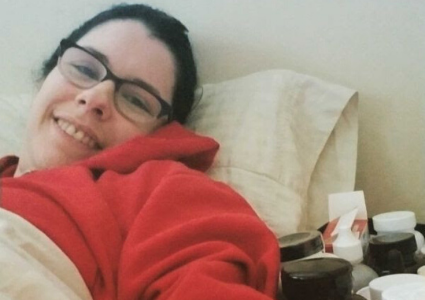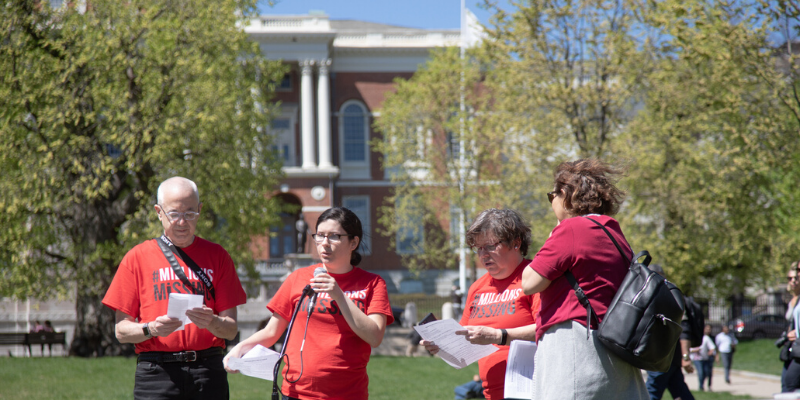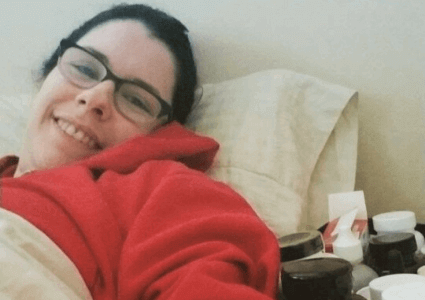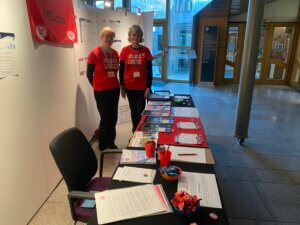
Claudia Carrera, 35, was halfway through her graduate program in musicology at New York University when her mild symptoms of myalgic encephalomyelitis (ME) became severe. She tried pushing through, but eventually had to return home to be cared for by her parents. Nowadays, she oscillates between accepting she may never accomplish her life goals––finish her dissertation, launch her academic career, or start a family––and and hope that research advancements will restore her health. There are more than 1 million Americans with ME like Claudia, fighting to return to their lives.

Claudia had an epiphany last April while watching the livestream of the National Institutes of Health (NIH) conference on ME/CFS from her bed. Having expected a major advancement, Claudia realized that at the current rate of research, a breakthrough is unlikely to happen anytime soon. “We need 10x the number of researchers investigating ME, if not 100x,” she realized. Not only that, this disease merits that level of investment. Almost every other major disease with similar prevalence rates and burden are funded by the NIH at hundreds of millions of dollars annually. (ME is at just $13 million.)
Claudia turned to #MEAction. She joined our team of staff and volunteers spearheading our #NotEnough4ME campaign, which is escalating pressure on the NIH to take urgent action and address the crisis of ME after 30 years of neglect. She became active in our People of Color with ME group working to address health disparities and develop strategies to reach communities of color. She helped organize a #MillionsMissing rally in her home state.
Claudia is just one of hundreds of advocates working with #MEAction to help build a robust scientific field for ME, through advocacy. That advocacy is a central part of how we will ultimately get the speed and scale of science we need. After all, according to research at the University of Michigan, every $1,000 spent by disease groups on advocacy resulted on average in a $25,000 increase in federal research funds the following year. If we want our fair share, we need to fight for it.
Will you join her?
That’s why we’re going to continue our fight for research funding. We will not stop until Congress and our federal agencies take urgent action. We are going to keep putting the patient voice at the center of research, educating our community and the public, doing outreach on university campuses to inspire young scientists and medical researchers, and making investments to build a field for the future.
But we cannot do it without your support.
Will you join us?
Can’t donate but want to support our mission? Share our donation page or Facebook fundraiser today. Or join one of the 43 community members who have started their own Facebook fundraisers and rallied their friends and family to support #MEAction. Every new person reached brings us closer to meeting our goal.
How We Fought for Research in 2019
Here is some of the work our staff and volunteers did in the last year to advocate for equitable research funding and build a more robust scientific field:
- Organized 178 advocates to storm the halls of Congress for the largest Advocacy Days in history, in partnership with Solve ME/CFS. The halls were filled with people wearing purple ME/CFS shirts, we could not be missed as we demanded our voices be heard!
- Mobilized thousands of constituents to achieve a hard-earned victory: the passage of a bipartisan U.S. Senate Resolution for ME/CFS. The first of its kind, this legislation was the culmination of three years of intense advocacy efforts. The resolution affirmed the United States’ commitment to support research to find the cause, develop treatments, and ultimately discover a cure for ME/CFS.
- Created a robust, community-driven campaign, #NotEnough4ME, that calls out the NIH for their lack of urgent action for people with ME. So far, over 7,000 patients, caregivers and allies have participated, with many more actions to come.
- Educated the community and public through our annual ME Research Summary, a collaboration with ME researchers and clinicians, by reporting on scientific conferences; surveying clinicians and researchers on the research criteria; and writing in-depth analyses of major publications, like the Cochrane review of graded exercise therapy.
- Supported our researchers by sharing new studies in need of human subjects and partnering with the Collaborative Research Centers.
- Inspired a new generation to join the ME field through our fellowship programs for young researchers.
- Expanded MEpedia, a wiki encyclopedia of ME science and history, whose 2,750 articles have been cumulatively viewed 16,071,856 times.






